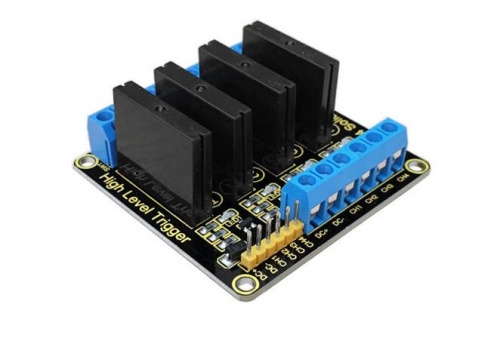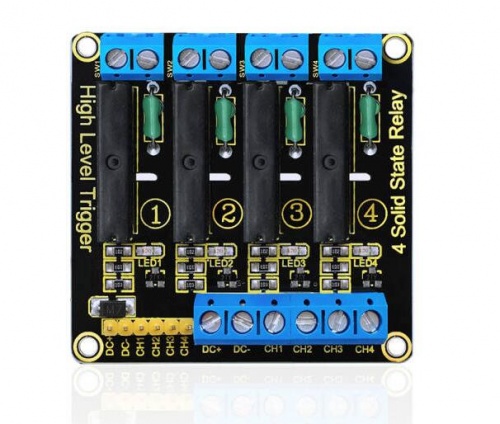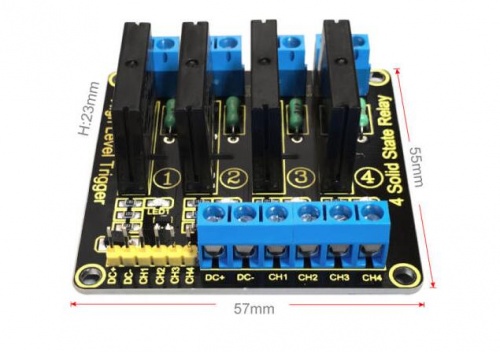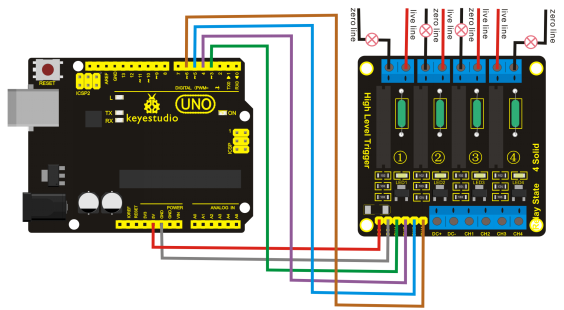Ks0265 keyestudio Four-channel Solid State Relay Module: Difference between revisions
Keyestudio (talk | contribs) No edit summary |
Keyestudio (talk | contribs) |
||
| Line 97: | Line 97: | ||
* '''PDF:''' <br> | * '''PDF:''' <br> | ||
https://drive.google.com/open?id=1hUkCtLh-d_HAmRfkDVpZllZHrEsjiNX- | https://drive.google.com/open?id=1hUkCtLh-d_HAmRfkDVpZllZHrEsjiNX- | ||
* '''Code:''' <br> | |||
https://drive.google.com/open?id=1fOlgG-K_BotBfaFJH12MrFI2AM6M3oFM | |||
* '''VIDEO:''' <br> | * '''VIDEO:''' <br> | ||
| Line 102: | Line 105: | ||
<br> | <br> | ||
==Buy from == | ==Buy from == | ||
Revision as of 11:19, 19 April 2019
Keyestudio Four-channel Solid State Relay Module
Introduction
Keyestudio four-channel solid state relay is a high level effective solid state relay, that is to say, the input control signals is the low level (0-2.5 V), the relay is off; while the input control signal is high level (3.3-5 V), the relay is on.
Solid State Relay is a new kind of contactless switching device which is composed of all solid state electronic components. Compared with the electromagnetic relay, its reliability is more higher, with the features of non-contact, long service life, fast and less outside interference.
The output control terminal of the keyestudio solid-state relay must be connected to the circuit, and its working current needs to be bigger than 50mA, so that the solid state relay can be disconnected normally.

Performance Parameters
- Electrical parameters:
| Voltage | Static Current | Working Current | Trigger Voltage | Trigger Current | |
|---|---|---|---|---|---|
| Channel 1 | DC 5V | 0mA | 12.5mA | 3.3-5V | 2mA |
| Channel 2 | DC 5V | 0mA | 12.5mA | 3.3-5V | 2mA |
| Channel 3 | DC 5V | 0mA | 12.5mA | 3.3-5V | 2mA |
| Channel 4 | DC 5V | 0mA | 12.5mA | 3.3-5V | 2mA |
- Output port: AC240V/2A
Connection Diagram
Sample Code
int BASE = 3 ; //The first relay I/O port
int NUM = 4; //Total number of relay
void setup()
{
for (int i = BASE; i < BASE + NUM; i ++)
{
pinMode(i, OUTPUT); //Set the digital I/O port to output
}
}
void loop()
{
for (int i = BASE; i < BASE + NUM; i ++)
{
digitalWrite(i, HIGH); //Set the digital I/O port outputs to "HIGH", that is, gradually open
delay(200); //delay
}
for (int i = BASE; i < BASE + NUM; i ++)
{
digitalWrite(i, LOW); //Set the digital I/O port outputs to "LOW", that is, gradually close relay
delay(200); //delay
}
}
Result
Wiring as the above image,after powered-on,four-channel solid state relay is first connected and then broken successively,repeating alternately.
Resource
- PDF:
https://drive.google.com/open?id=1hUkCtLh-d_HAmRfkDVpZllZHrEsjiNX-
- Code:
https://drive.google.com/open?id=1fOlgG-K_BotBfaFJH12MrFI2AM6M3oFM
- VIDEO:
http://video.keyestudio.com/ks0265/


